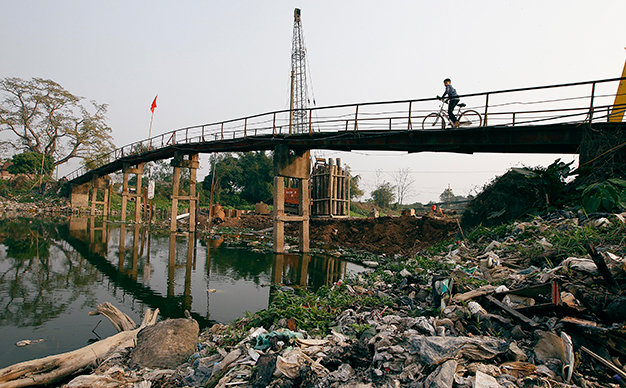Vietnamese environmental protection authorities have just released a list of pollution-linked “cancer villages” upon the conclusion of a project’s initial phase.
The first phase of a project which focuses on identifying the causes behind disease and locating safe water resources in 37 “cancer villages” across Vietnam has been completed.
“Cancer villages” are where there is an alarmingly high concentration of water pollution and people suffer from numerous infectious diseases and cancer.
The project was launched by the Ministry of Natural Resources and Environment. Its second phase is awaiting permission to proceed.
The water sources in the villages, found in 22 different cities and provinces across the country, are seriously polluted.
Those with the most tainted water sources are located in Hanoi’s Ung Hoa and Chuong My districts; Bac Ninh’s Yen Phong District; and Thanh Hoa’s Nong Cong in the north; Nghe An’s Dien Chau District; Ha Tinh’s Loc Ha District; Quang Ngai’s Binh Son District; and Binh Dinh’s Hoai Nhon District in the central region, according to the project’s findings.
The findings also revealed that there have been 1,136 deaths from cancer in these villages over the past few years. 380 people from communes in the vicinity have also died of cancer.
Dr. Ho Minh Tho, the project’s overseer, observed that Thach Khe Village in Lam Thao District in the northern province of Phu Tho had the most fatalities of all, with 139 villagers perishing from the deadly disease.
The village with the lowest number of cancer casualties is still home to at least six.
There are cases when up to five people in the same family suffer from cancer, three of whom died, Tho noted.
According to Nguyen Luu, head of the Central Vietnam Division for Water Resources Planning and Investigation (CEVIWRPI), which is based in Nha Trang in the south-central province of Khanh Hoa, the project’s first phase has yet to come to any conclusion on the causes of cancer.
Investigators collected and analyzed 814 water samples from rivers, streams and wells which residents at 37 “cancer villages” have been using for a long time, Dr. Tho noted.
“Over 80%, 65% and 30% of the microbe, pollution and iron concentration analyses, respectively, exceed allowed rates,” he added.
Dr. Tho pointed out that the project’s second phase aims at locating safe water sources in place of the tainted ones.
“We have proposed supplies of clean water supplies be provided for the 10 ‘cancer villages’ with the most seriously tainted water sources. Clean water sources will also be sought for the other villages, if funding allows,” he noted.
One example is Dong Lo Commune in Hanoi’s Ung Hoa District.
The commune is home to over 1,000 households with more than 6,000 residents, all of whom have to use well water supplies on a daily basis.
Those living along the dykes of the alarmingly polluted Nhue River also suffer intolerably, as the wells they use are also affected by the river’s contaminated underground streams.
According to an official from the capital’s Department of Agriculture and Rural Development, the water resources consumed by those living along the Nhue River are contaminated with “asen,” a toxic element. The contamination rate is over 100 times as much as the allowed rate.
In the past few years, the city government has provided free filters for poor families and suggested that local households build filtering tanks, but the filter devices have proved little help against the gravely contaminated water sources.
Late last year, the Ministry of Health conducted the first-ever large-scale inspection on the quality of the running water supplies in Ho Chi Minh City and Hanoi.
The results found that even the water supplied by plants in Hanoi contain a worryingly high amount of “asen.”
The ministry representative admitted that hurdles to providing safe water sources remain overwhelming.






















































